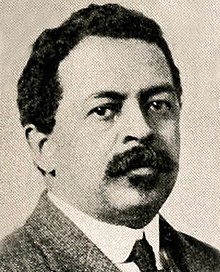
Back ويليام مونرو تروتر Arabic ویلیام مونرو تروتر AZB William Monroe Trotter French William Monroe Trotter SIMPLE
William Monroe Trotter | |
|---|---|
 1915 photograph | |
| Born | William Monroe Trotter April 7, 1872 near Chillicothe, Ohio, U.S. |
| Died | April 7, 1934 (aged 62) Boston, Massachusetts |
| Alma mater | Harvard University |
| Spouse | Geraldine "Deenie" Pindell |
| Scientific career | |
| Fields | Civil rights, real estate |
| Institutions | Boston Guardian |
William Monroe Trotter, sometimes just Monroe Trotter (April 7, 1872 – April 7, 1934), was a newspaper editor and real estate businessman based in Boston, Massachusetts. An activist for African-American civil rights, he was an early opponent of the accommodationist race policies of Booker T. Washington, and in 1901 founded the Boston Guardian, an independent African-American newspaper he used to express that opposition. Active in protest movements for civil rights throughout the 1900s and 1910s, he also revealed some of the differences within the African-American community. He contributed to the formation of the National Association for the Advancement of Colored People (NAACP).
Trotter was born into a well-to-do family and raised in Hyde Park, Massachusetts. J. M. Trotter a Recorder of Deeds and Virginia Trotter were his parents.[1] He earned his graduate and post-graduate degrees at Harvard University, and was the first man of color to earn a Phi Beta Kappa key there. Seeing an increase in segregation in northern facilities, he began to engage in a life of activism, to which he devoted his assets. He joined with W. E. B. Du Bois in founding the Niagara Movement in 1905, a forerunner of the NAACP. Trotter's style was often divisive, and he ended up leaving that organization for the National Equal Rights League. His protest activities were sometimes seen to be at cross purposes to those of the NAACP.
In 1914, he had a highly publicized meeting with President Woodrow Wilson, in which he protested Wilson's introduction of segregation into the federal workplace. In Boston, Trotter succeeded in shutting down productions of The Clansman in 1910, but he was unsuccessful in 1915 with screenings of the movie The Birth of a Nation, which also portrayed the Ku Klux Klan in favorable terms. He was not able to influence the peace talks at the end of World War I, and was in later years a marginalized voice of protest. In 1921, in an alliance with Roman Catholics, he got a revival screening of The Birth of a Nation banned. He died on his 62nd birthday after a possibly suicidal fall from his Boston home.